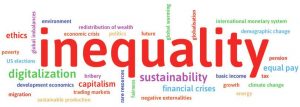I don’t usually post about a book before I’ve finished reading it, but this one is going to take me a time to get through and it’s worth sharing. The Economy is a free online textbook on economics, produced collectively by CORE, an international group of economists who are concerned about the way that economics has become detached from the real world.  The word cloud in this image is the way they indicate their priorities in the preface. (My own reservations about economics as a discipline can be found in an article in the Real World Economics Review published last year.)
The word cloud in this image is the way they indicate their priorities in the preface. (My own reservations about economics as a discipline can be found in an article in the Real World Economics Review published last year.)
I’m not going to endorse everything in the textbook, because there are various issues in the way economists think about their subject that I’ve been critical about. I’ve got far enough into the textbook to be able to make reservations about indifference curves, the subject of the third section, or the applicability of game theory, the subject of the fourth. (My criticisms of those methods can be found in my book on Reclaiming Individualism). I do want, however, to welcome the approach, the accessibility of the document, and the determination of the team to make the text available to everyone.
Further note, 29th March 2018. I have at last got to the end of the book. There are various points where I’d raise issues. Some of them are deficiencies in the discipline of economics itself (for example, the narrow perspective on democracy, or the curious lack of material about poverty). Some are based on questionable selections: examples are the acceptance of the idea that there is an equilibrium to be attained in the labour markets, or the treatment of lending and borrowing as a principal-agent problem. Some issues could be improved; despite genuflections in the direction of policy, it’s not informed by the literature on public policy. There’s only one section where I’d recommend students to steer clear, and that is the discussion of inflation and unemployment. It fails to disambiguate – that is, to recognise that the concepts are used differently by different economists – and the result is a muddle. Its assumption of a relationship between unemployment and inflation, in the teeth of the evidence, derives from a basic failure to understand that inflation describes a relationship between money and markets, not an independent phenomenon.
Paul, please allow me one comment – after teaching with reference to this book for one year at Bangor College China [for the earlier teaching there I had been obliged to use the ‘old standard’]. So here the comments
https://wp.me/p1qrWe-12r
and also here https://www.researchgate.net/project/Academic-Education
some reflections, in particular the piece: Third Level Education Today Assessment reports of a third-elevel educational joint venture project _ China-Europe.
What especially was … well, actually annoying is the fact that the responsible ‘economist’ in Wales was absolutely irresponsible as far as communication was concerned, and in my modest assessment this was consequence of his ongoing narrow – and wrong – understanding of economics. Form the latter I can understand your reservations; in the other hand, remember the story dealing with baby and bathing water ….
Thanks and best wishes, Peter